- Home
- Mack Maloney
Strike Force Delta s-4 Page 6
Strike Force Delta s-4 Read online
Page 6
He found his way to the bottom level of the five-story prison, soon arriving at his master sergeant’s post. The man jumped to his feet and greeted Faheeb with a deep bow. Faheeb replied with a hard slap to the man’s face. This was his way of asking the sergeant a question: How are our guests? The Delta soldiers? Are they still alive?
The sergeant covered his head and began yipping. “Yes! Yes!” They had survived the night, despite the repeated torture sessions.
“And everything is on videotape?” Faheeb bellowed.
“Recorded in color,” the sergeant replied in Arabic.
Faheeb slapped him again, but this time less hard, almost affectionately.
“Good dog,” Faheeb told him. “You get to eat and sleep and breathe, for at least one more day.”
Faheeb started off again for the front entrance, and this time his nostrils did detect the faint stink of gasoline.
The fuel truck was near.
* * *
The front of the prison was just 20 feet from the edge of the town. The local Africans were wise enough to stay clear of the area at this time, on this day — everyone knew when the gasoline truck made its delivery. The prison’s guards were known to drink heavily while on duty. They also had itchy trigger fingers. The tension that could arise when the fuel truck arrived made these two things a bad combination. So every other day when the gas truck arrived from the docks a half-mile away, the streets were usually empty.
It got a bit tricky security-wise on delivery day. This was really the only instance when outsiders were allowed into the otherwise impregnable fortress; that’s why Faheeb always had two days’ worth of food delivered at the same time. It was also why he made a habit of intimidating the fuel-truck drivers whenever they appeared. Inside these walls should be last place anyone would want to be. Faheeb also insisted that the same drivers never appear twice. He didn’t want anyone getting too good a look around in here. Especially with the eight new “inmates” the prison had taken in recently.
There was also a safety issue involved: Even though there was a rudimentary fire-suppression system in place, the prison was literally a powder keg of TNT — its most radical defense against an outside attack. But now they were allowing a truck filled with four-hundred gallons of gasoline to drive in the front gate. One spark — from an improperly tuned car engine or the flick of a cigarette — and the prison and at least half of Loki Soto would be blown sky-high, long before any water sprinkler system kicked in. So Faheeb had to make sure that not only were the people driving the truck on their toes, but the men who would be watching over the operation were alert as well.
He reached the main door to find the officer of the personal guard waiting for him. This man was in charge of the 10 extra fighters who, along with the prison’s normal contingent of guards, provided the muscle for this place. These extra gunmen were the hard-core Al Qaeda members inside the fort. They were like Faheeb’s Praetorian Guard; where he went, they went. This morning they would be stationed on the ramparts just above the main door, ready to blast away at anything that even hinted of hostile intent.
Faheeb slapped this man as well, but very gently. The officer reported his people were in position and ready. Faheeb glanced up the wooden stairway to the left of the door, and indeed he could see half of his bodyguards already leaning over the west-facing wall, their AK-47 assault rifles up and loaded. Two huge Chinese machine guns were also in the mix. Anyone making a wrong move out on the street, in the nearby buildings, anywhere, would be facing a virtual wall of gunfire.
It was now 10:00 A.M., delivery time. The officer of the guard called down from the next floor that the truck was indeed approaching the gate. Faheeb drew up his own rifle and then nodded to the man sitting next to the gate controls. He punched a button that activated a chain pulley assembly, and slowly, like something from medieval times, the huge wooden door began to draw open.
The twin smells of the morning’s tide and the stinking gasoline hit Faheeb at once. It was another day in Loki Soto. Beyond was the slummy downtown and, beyond that, the port itself, as usual full of coastal tankers, dilapidated fishing boats, and rusty containerships.
Faheeb pulled a kerchief over his nose and mouth, a thin barrier against the stench. The old four-wheel tanker truck was waiting right where it always was, about ten feet from the edge of the bridge that crossed the moat and led to the prison’s front door. Per procedure, the truck would wait here until receiving directions from Faheeb himself.
It idled while Faheeb did his own look around. He scanned the street in back of the truck, the moat, and the roofs of the buildings beyond. Everything seemed clear. The food delivery kids had arrived at the same time. Faheeb brusquely waved them in; they scampered across the bridge with baskets of sugar rolls, pita bread, and raw lamb. Then he pointed in a sinister way at the driver of the fuel truck and indicated he, too, should come forth.
The man hit the accelerator a bit too hard, causing the truck to backfire and nearly giving everyone involved a heart attack. The tension became as thick as the stink in the air. The truck rumbled uncertainly across the old bridge, its driver hidden by the early-morning shadows. Faheeb watched its approach like a hawk. Was it going a little slower than usual? Was this even the right truck? He raised his weapon a notch. Was something wrong here? Or was his paranoia just getting the best of him?
Faheeb stayed frozen in the open doorway as the gas truck lurched through the main gate and finally stopped. He immediately yanked the driver from the cab. Faheeb was a big man, and the driver was a slight black teenager. Or at least that’s what he appeared to be.
Faheeb began slapping the driver viciously, this as his guards closed in on the driver’s assistant in the passenger seat.
“What do you know?” Faheeb screamed at the driver. “Who sent you here to do this?”
But the driver could only cover up from the blows and shake his head. “It is my job!” he began screaming back. “Just my job!”
Faheeb finally stopped striking the man and pushed him back toward the tanker’s hose. “If it is your job, then get your lazy ass to work!” he shouted at the man.
Meanwhile, the bodyguards allowed the passenger to get out of the fuel truck and together he and the driver dragged the delivery hose across the room. Here a four-hundred-gallon tank sat, taking up one end of the vaultlike enclosure. This was where the fort’s lifeblood gasoline was stored.
The driver nervously attached the hose to the tank and started pumping. Half of the bodyguards came down from the ramparts, their weapons turned toward the driver and his helper. Faheeb knew the two African youths would have made perfect suicide bombers, igniting the truck and destroying the fort and everything in it. Luckily, the enemies of the people Faheeb worked for didn’t operate like that. At least, he didn’t think they did.
The refueling went unmercifully slow as always. Once the gas was flowing it didn’t seem like it would take all that long for the four hundred gallons to go from truck to tank, but at this point Faheeb imagined the gas moving in slow-motion dribs, drabs, and drops. There should have been a larger storage tank here; everyone involved knew this would have made more sense. Then these three-times-a-week sessions could be reduced to something more manageable, like once a week. But that would be against the financial wishes of Faheeb’s superiors. Al Qaeda was much too cheap to buy a large, safer tank.
The tension grew almost unbearable. Faheeb’s stomach was in knots. He was sure that at any minute the back of the tank truck would burst open and some country’s special ops forces would come tumbling out and then they’d all be on their way to a fiery end.
But no…
That did not happen.
The tank truck finally ran dry. The driver and his assistant quickly jumped back inside and backed out of the fort. The doors were closed, and the stink of gas left Faheeb’s nostrils. The tension eased. Faheeb took his Arab-style skullcap and wiped the sweat from his brow. At least that was over.
He
called to his remaining bodyguards up on the roof. It was time for breakfast. Faheeb retreated back to the kitchen, the weight of Allah off his shoulders once again. A cup of tea was waiting for him; so was a fresh sugar roll. His bodyguards arrived moments later. As they were his best fighters, they always dined with him.
Faheeb took his seat at the head of the old wooden table. His bodyguards sat around him and waited — only Faheeb could start the meal. He faked a prayer and, now ravenous, took a huge bite of his sugar roll. His men did the same a second later.
A second after that, Faheeb went over in his chair, his head hitting the floor with a loud, bloody crack. White foam spewed from his mouth. He shook once, violently — and then he was dead. The 10 men around him all hit the table a moment later, following their leader into the black hole of death. All of them victims of the sweet pastries that today were covered with fastacting highly toxic curare poison made to look like sugar.
Just like that, nearly half the prison’s hard-core gunmen were eliminated.
The first Superhawk helicopter crashed onto the prison’s roof a moment later.
* * *
Captain Johnny Jackson was dreaming that Boy Scouts had rescued him when he heard the mighty crash. He was chained, by hands and feet, in the lowest jail cell at the bottom of the notorious Diablo fortress. The cell was just six feet by six, big enough for him and his torturers — three if they all squeezed in. Just big enough to reel back with a whip or a piece of electrical cord or a rubber hose. That’s what his tormentors had been using on him, 12 times a day, 24 hours a day, for the past six days. The bottom of his cell was covered with his own blood.
It was the worst kind of torture. His kidnappers did not want to kill him; nor did they want to get information out of him. That would have meant the beatings and whippings had a point to them. No — they were doing it to him, these Al Qaeda people, simply because they liked it, got a rush from it, found it satisfied their ingrained long-repressed sexual urgings, twisted from eons of wandering in the desert and stepping in camel shit. They did it because they were all sadists deep inside — all terrorists were; he knew this much from his Delta Thunder training. They did it simply because they could.
Jackson was the team leader of the captured Thunder squad. He hadn’t seen any of his men since they’d been overwhelmed at the border crossing, after the murderous lopsided gunfight. His last visions of that night were the pile of bodies in front of their makeshift barricade, the storm of tracers going in both directions, and the French Army helicopter waiting nearby, doing nothing to help.
He and his men had been betrayed. That much was clear. But who exactly had stabbed them in the back? Who’d revealed that they would be accompanying the plutonium shipment? The British mercs? The United Nations? The Angolan fighters? The French?
It really didn’t make any difference now. They’d been caught and they were in a place that was impregnable, and because of Thunder team’s supersecret status he knew a rescue attempt was highly unlikely. Thunder was the “Mission Impossible” element of Delta — if they were caught, the President would disavow any knowledge of them… blah… blah… blah.
Africa was Delta Thunder’s beat. Riding shotgun that night was just their sort of job — though many times they would go right into target cities before doing a mission and become one with the population. They were experts at blending in. That was another reason for their deep-secret status: Everyone in the Thunder unit was black.
It was almost an inside joke, this rap on the United States’ special ops units that seemed to hold water. There were many special warriors fighting for the Stars and Stripes — but most of them were white. Why? Were America’s Special Forces racist? Discriminatory? At least in the case of Delta Force, the answer was no. In fact, in the past few years Higher Authority had secretly selected the most qualified black candidates for units such as Delta Thunder, one of six operating in Africa, sometimes hiding their advancement by pretending to wash them out. This had been kept so quiet, most people in Delta Force itself did not know. But the black warriors were out there, fighting just as hard for America and her ideals as their white brethren.
And sometimes they died doing it. And this was certainly going to happen to Thunder squad. Jackson knew it because their kidnappers had already told them they were going to be beheaded, one by one, on videotape, which would then be broadcast to the world on Al-Qazzaza. So they were all going to die, and soon. In a way, Jackson at peace with this — some of the time anyway. But the other times, when he thought about how it was actually going to happen, it was just awful.
That’s why it was so strange that in between the beatings — which would go on for exactly 30 minutes — Jackson would fall asleep. Sleep soundly and deeply and have vivid dreams of his home and family back in Brooklyn, of helping his wife with her term papers and bringing their son to Boy Scouts meetings, and how those Boy Scouts had all jumped on a plane at Kennedy, flown over to wherever the hell he was, and were breaking him out of this hell.
And that’s what he was dreaming about when he heard the mighty crash on the roof.
He woke up thinking: The Boy Scouts are here…
And he was close.
* * *
The first Ghost Team helicopter crashed atop the prison roof at exactly 1015 hours — precisely the moment Murphy had planned it to.
The pilot was Red Curry, one of the original team members. He’d flown full throttle at treetop level for 20 miles, sneaking up from the south. He’d counted down the seconds on the mad dash in, hoping that the curare-sugar concoction conjured up at the bottom of the Ocean Voyager and placed inside the prison’s pastries by the local bakers for a hundred-dollar bill would work as quickly as the Spooks said it would. If so, he knew it would make this job a lot easier. If not, well…
Curry also knew about all the antiaircraft weapons on the prison’s roof. He knew their locations backward and forward after studying Murphy’s meticulously drawn sketches of what their objective looked like. He knew the portable SAM teams were stationed at each corner of the square-topped building — four teams, probably a total of 20 missiles. Placed in between were the largecaliber guns, twice as many as the missile teams, eight in all, plus the 88mm artillery piece. These were all extremely formidable obstacles.
That’s why it was decided to crash one of the new copters onto the roof — sacrificing it for the mission. True, landing normally would have taken mere seconds. But with all the firepower up top, seconds were hours, the difference between life and death, success and failure.
Besides, intentionally crashing a copter was easy. You just slammed it down, with no worries about particulars, like breaking rotors or landing gear or tail flaps. Make a lot of noise, cause a lot of confusion, and drop a lot of smoke. And always come in firing.
Curry was the only one at the controls. His crew of four was on the aircraft’s quartet of massive M-60 machine guns, blazing away. The plan was to bang in on the east corner of the fort, take out the missile team and the gunners on either side of them. If Curry was able to do this — in about six seconds — then a second copter, coming out of the north, again at treetop level, could hit the south side of the fortress, KO the remaining machine guns, artillery pieces, and missile teams, then set down next to the crashed copter. This would allow copters three and four to come in and deposit on the roof the Ghost Team’s shock troops, who would then attempt the actual rescue.
And this is exactly how it happened. Curry’s copter came down with such violence, it cracked the stone roof of the prison. The copter was intentionally low on gas, preventing the chance of a fiery disaster. However, Murphy had attached a dozen cans of lubricating oil to its airframe, which did catch fire on impact, immediately causing a huge cloud of smoke. The second copter came in just a second or two early, nearly landing in Curry’s line of fire. Its gunners nailed everything on the west side of the building’s roof, though, including the forest of TV antennae. As planned, the billowing smoke hid the
approach of copters three and four. They swooped down on the remaining guards so quickly, their guns blazing, barely a shot was fired in return.
It was all over in 12 seconds — again exactly the time Murphy thought it would take. Suddenly there were 24 strike force members on the roof and in control of its weapons — and they’d received nothing but a few scratches in return.
So much for the easy part.
* * *
They had to get down into the prison itself — and again, they really hoped the poison had done its job. Two Delta guys had stolen into the town the night before; they’d made the deal with the very willing bakers and seen the cakes poisoned right before their eyes. But did the mooks eat breakfast at the same time every day as Murphy had somehow determined? They were going to find out.
Murphy had also figured there were about 36 guards in the prison in all, both hard-core Al Qaeda members and local thugs. This was almost twice the number of American shock troops. And only 12 of the Americans would be going below. The rest would stay atop the roof and keep it secured while the rescue operation was ongoing.
But, if the poison had done its work, then there would only be about a dozen or so guys down below they had to kill. If the poison hadn’t worked, a small army would be waiting for them.
The so-called Inside Men prepared to make their way down into the prison, this as the troopers staying on the roof tossed all the dead mooks over the wall to the moat below. The Inside Men finished checking their equipment and declared themselves ready. But there was one more piece of the plan that had to happen first. They waited — but just a few seconds. Then they saw it coming: Ryder’s Harrier. Trailing smoke, wings a bit wobbly, rocketing just a hundred feet above the harbor. It was on time and moving incredibly fast.
The jump jet went over the roof a moment later. It barely cleared the top of the wrecked number-one helicopter; that’s how low it was flying. The noise was incredible, its shock wave like thunder. It shook the thick-walled prison and all the buildings all around it. This was the cue the shock troops were waiting for. The strike team headed down the stairs.

 Strike Force Bravo s-2
Strike Force Bravo s-2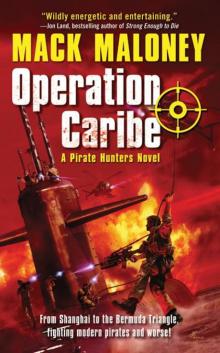 Operation Caribe ph-2
Operation Caribe ph-2 Beyond Area 51
Beyond Area 51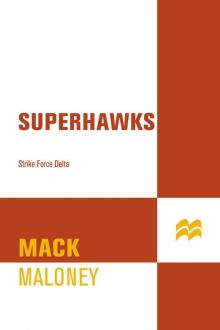 Strike Force Delta
Strike Force Delta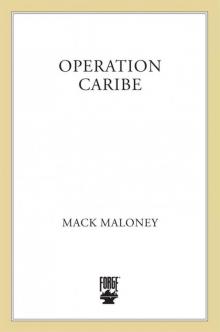 B00447820A EBOK
B00447820A EBOK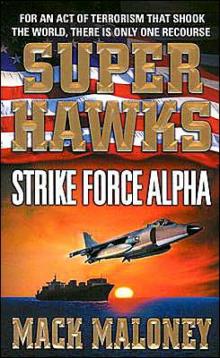 Strike Force Alpha
Strike Force Alpha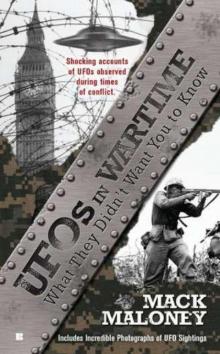 UFOs in Wartime: What They Didn't Want You To Know
UFOs in Wartime: What They Didn't Want You To Know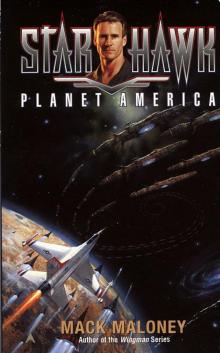 Planet America s-2
Planet America s-2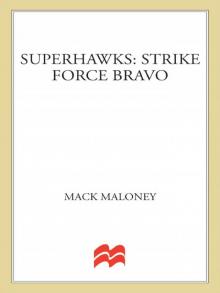 Strike Force Bravo
Strike Force Bravo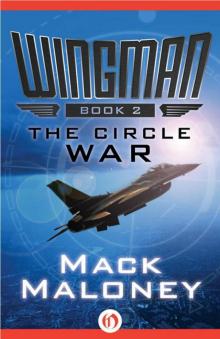 The Circle War w-2
The Circle War w-2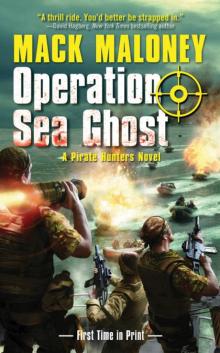 Operation Sea Ghost ph-3
Operation Sea Ghost ph-3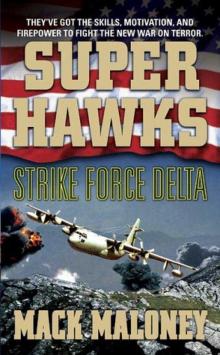 Strike Force Delta s-4
Strike Force Delta s-4 The Wingman Adventures Volume One
The Wingman Adventures Volume One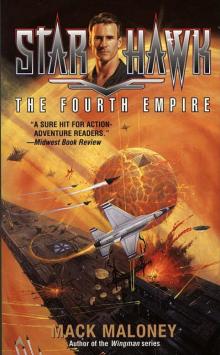 The Fourth Empire s-3
The Fourth Empire s-3 Battle at Zero Point s-4
Battle at Zero Point s-4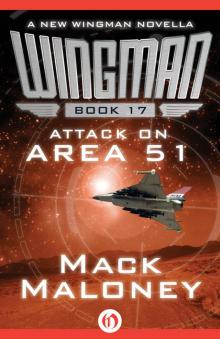 Attack on Area 51
Attack on Area 51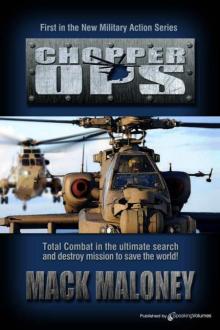 Chopper Ops
Chopper Ops B003IKHEWG EBOK
B003IKHEWG EBOK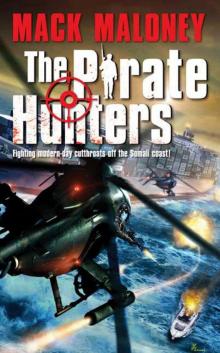 The Pirate Hunters ph-1
The Pirate Hunters ph-1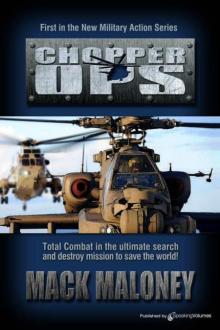 Chopper Ops co-1
Chopper Ops co-1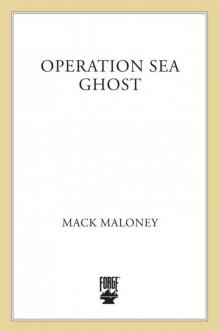 B005J4EW5G EBOK
B005J4EW5G EBOK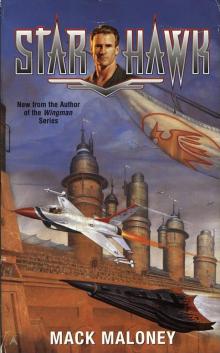 Starhawk s-1
Starhawk s-1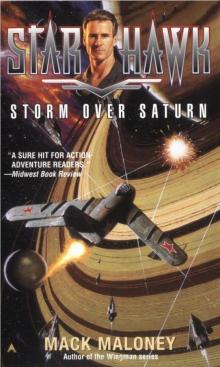 Storm Over Saturn s-5
Storm Over Saturn s-5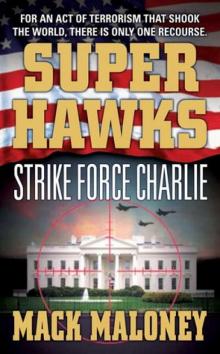 Strike Force Charlie s-3
Strike Force Charlie s-3